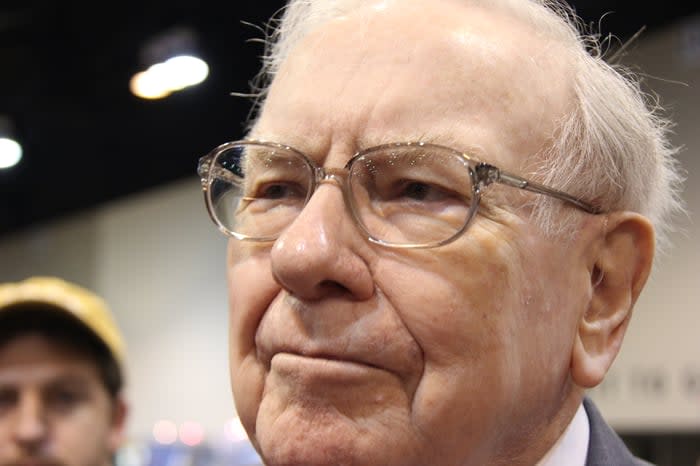3 Ultra-Popular Stocks Billionaire Investors Are Selling
Investors are never lacking for data on Wall Street. We're currently in the heart of earnings season, and economic data continues to be reported on a near-daily basis. But arguably the most important data release of the quarter is set to occur this Wednesday, May 15. This marks the deadline for institutional money managers to file Form 13F with the Securities and Exchange Commission.
A 13F provides an over-the-shoulder snapshot of what Wall Street's brightest minds, with at least $100 million in assets under management, have been buying, selling, and holding in the most recent quarter -- in this instance, the March-ended quarter. It's not uncommon for professional and everyday investors to follow in the footsteps of Wall Street's most-successful asset managers.

Image source: Getty Images.
But you don't have to wait until this coming Wednesday to get a sneak peak at what some of Wall Street's most-prominent asset managers have been up to. Thanks to interviews, annual meetings, and earnings releases, select billionaire investors have revealed selling activity in three ultra-popular stocks during the first quarter.
Stanley Druckenmiller sells shares of Nvidia
The first widely owned stock that was given at least a partial heave-ho during the March-ended quarter is semiconductor titan Nvidia (NASDAQ: NVDA). In a recent interview on CNBC's Squawk Box, Druckenmiller admitted that his fund, Duquesne Family Office, cut its position in Nvidia in "late March." For context, Duquesne Family Office held 617,494 shares of Nvidia, along with 489,500 Nvidia call options, as of Dec. 31, 2023.
Although Druckenmiller believes the value of artificial intelligence (AI) for corporate America may be undervalued looking five years into the future, he admits that near-term hype may have gotten ahead of itself for AI stocks, including Nvidia.
For the moment, Nvidia's A100 and H100 graphics processing units (GPUs) are the undisputed top choice by businesses operating AI-accelerated data centers. In particular, the H100 is powering generative AI solutions and helping to train large language models.
However, the coming 12 months could prove especially challenging for the backbone of the AI revolution.
For starters, competition is coming at Nvidia from all angles. Advanced Micro Devices and Intel have AI-accelerators designed to go toe-to-toe with Nvidia's H100 in enterprise data centers.
Meanwhile, Nvidia's top four customers (roughly 40% of net sales), which are members of the "Magnificent Seven," are all developing AI-GPUs of their own. Even if these chips are complementary to Nvidia's H100 GPUs, it seems highly likely that the Magnificent Seven will be far less reliant on Nvidia's AI infrastructure beyond 2024.
Last year, AI-GPU scarcity was the driving force behind Nvidia's 217% sales growth from its Data Center segment. But as AMD, Intel, and other Magnificent Seven companies deploy their own chips, Nvidia could struggle to maintain its otherworldly pricing power on its GPUs.
The final nail in the coffin is that every next-big-thing investment trend for three decades has endured a bubble in its early innings of expansion. It's incredibly likely that investors will, once again, overestimate the adoption of a new technology. If history repeats itself and the AI bubble bursts, no company will be hit harder than Nvidia.

Berkshire Hathaway CEO Warren Buffett. Image source: The Motley Fool.
Warren Buffett dumps Paramount Global
Another billionaire investor that let the cat out of the bag before releasing a required 13F is Berkshire Hathaway CEO Warren Buffett. During his company's annual shareholder meeting on May 4, the "Oracle of Omaha" confessed that all shares of media behemoth Paramount Global (NASDAQ: PARA) -- 63,322,491 shares, as of Dec. 31, 2023 -- were sold at a loss during the first quarter.
Buffett typically approaches his investments outside of the financial sector with a focus on consumer habits. His thesis was likely that a rebound in advertising for Paramount's TV network segment, coupled with a lengthy history of consumers gobbling up traditional and streamed content, would allow Paramount to regain its luster. Unfortunately, this failed to come to fruition.
Like most legacy media companies, Paramount has struggled to make its direct-to-consumer segment profitable. The costs associated with building its content library and marketing its streaming network have weighed on its bottom line.
But if there's a silver lining here, it's that global DTC subscriber count and average revenue per user are climbing, which suggests that Paramount has been successful in raising subscription prices without scaring away its members. The company noted that year-over-year operating losses before depreciation and amortization have shrunk in each of the last four quarters for its DTC segment.
The advertising environment has been challenging, as well. Last year, a couple of predictive indicators, such as the first sizable decline in U.S. M2 money supply since the Great Depression, signaled a high probability of the U.S. falling into a recession. Advertisers often front-run economic weakness by reducing their spending. Weaker ad revenue has undeniably hurt Paramount's legacy TV network.
There's also been concern about Paramount's ability to service its $14.6 billion in long-term debt ($12.2 billion in net debt). Unless the company can substantially lessen its streaming losses, it's going to be difficult to silence critics.
The "Oracle of Omaha" also pared back Berkshire's stake in Apple
The Oracle of Omaha's selling didn't end with Paramount Global. Although we have to wait a few more days to get the complete story, Berkshire Hathaway's first-quarter operating results show that a sizable chunk -- about 115 million shares -- of the company's stake in tech stock Apple (NASDAQ: AAPL) was given the heave-ho.
In addition to Berkshire's operating results spilling the beans, Buffett freely admitted during his company's annual shareholder meeting that he and his investment team pared down this mammoth stake in the March-ended quarter. He justified this reduction by pointing to corporate tax rates. Buffett opined that investors would come to appreciate Berkshire locking in gains at a 21% peak corporate tax rate given the likelihood that corporate tax rates rise in the future.
Despite jettisoning around 13% of his company's stake in Apple, Warren Buffett still views the company as Berkshire's best business.
Apple has an exceptionally loyal base of customers, and it's frequently led with innovation. CEO Tim Cook has successfully overseen the development of domestic market share-leading iPhones, as well as Apple's transformation to a platform's company.
But if you asked Warren Buffett what his favorite thing is about Apple, it might very well be the company's unsurpassed capital-return program. Apple is on track to dole out a little over $15.4 billion in dividends to its shareholders this year, and has repurchased $674 billion worth of its common stock since initiating a buyback program in 2013. Buffett loves buybacks because they can incrementally increase the ownership stakes of long-term investors.
However, Apple isn't immune to headwinds. Following a modest sales decline in fiscal 2023 (Apple's fiscal year ends in late September), the second-largest public company by market cap has seen its net sales slip by less than 1% through the first half of the current fiscal year. While subscription services revenue has been strong, physical product sales remain weak.
Furthermore, while modest cost-cutting and an aggressive share repurchase program have kept earnings per share (EPS) moving in the right direction, a deeper dive into Apple's net income shows the company's growth engine has stalled.
Apple was a bargain when it was delivering sustained double-digit sales growth and trading at a multiple of 10 to 15 times forward-year EPS. But at 27 times forward-year EPS and with sales going nowhere, this Wall Street darling looks to be losing its sheen.
Should you invest $1,000 in Nvidia right now?
Before you buy stock in Nvidia, consider this:
The Motley Fool Stock Advisor analyst team just identified what they believe are the 10 best stocks for investors to buy now… and Nvidia wasn’t one of them. The 10 stocks that made the cut could produce monster returns in the coming years.
Consider when Nvidia made this list on April 15, 2005... if you invested $1,000 at the time of our recommendation, you’d have $550,688!*
Stock Advisor provides investors with an easy-to-follow blueprint for success, including guidance on building a portfolio, regular updates from analysts, and two new stock picks each month. The Stock Advisor service has more than quadrupled the return of S&P 500 since 2002*.
*Stock Advisor returns as of May 6, 2024
Sean Williams has positions in Intel. The Motley Fool has positions in and recommends Advanced Micro Devices, Apple, Berkshire Hathaway, and Nvidia. The Motley Fool recommends Intel and recommends the following options: long January 2025 $45 calls on Intel and short May 2024 $47 calls on Intel. The Motley Fool has a disclosure policy.
